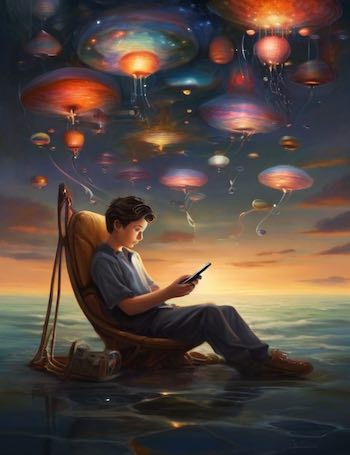Star awake, absent from sleep
Why isn’t the smartphone, the star of our laborious days, absent at night? Of more than 16,000 dream reports, the smartphone is only reported in 3% of them and often in connection with something else, for example a call from a loved one. Alice Robb, author of ‘Why We Dream – The Transformative Power of Our Nocturnal Adventures’ believes that dreams are a defense mechanism. They would be a way to work on our anxieties in the safety of sleep and train us to face the stress of real life. The smartphone being a reassuring and controlled object, it has nothing to do with dreams.
Elliot Mawas in Philomag is not convinced and rightly points out that the smartphone is not an object like the others. It gives way to the facts to which it binds us. It has no narrative value in itself.
The psychoanalyst Sophie Mendelsohn thinks for her part that the smartphone connects us to a virtuality and not a spatiality. But it is spatiality that is very present in dreams. They dig into tangible everyday events, not virtual ones.
Let’s not get lost
Then Elliot Mawas takes up another track, that of the transitional object, a concept forged by the English psychoanalyst Donald W. Winnicott. These objects would be substitutes for mom or cuddly toy, explaining the distress of no longer having them within immediate reach. They would then be vectors of a daytime and not nighttime therapy. Severely far-fetched explanation. On the contrary, one would expect greater nocturnal celebrity from such a lively presence during the day.
Note that if the smartphone is not present in dreams, addictive games that glue us to it gladly are. Exit then the transitional object as well as the excess of virtuality: games are the prototype of the virtual world.
The influence of the virtual is attested indirectly by the arrival of television in the 20th century. Dreamers began to dream in black and white, then in color after the invention of color TV. In communist Poland, where color came later, people continued to dream in black and white for longer.
And the investigation is coming to…
The best guess, ultimately, is the second on this list. The smartphone is only an additional perception tool. It does not fabricate any narrative by itself. Our dreams are interested in stories because it is the analytical and predictive centers that generate them. These levels of the psyche mock our organs, limbs and senses. We don’t dream of smartphones any more than we dream of our arms, eyes or ears. They are not the world but the transparent instruments that present it. Nothing new to look for in their operation. While their productions, on the contrary, are constantly renewed. It is from them that the dreamer, this crazy screenwriter, draws its inspiration.
*
Why Don’t We Dream About Our Smartphones?, The Cut
Why We Dream: The Transformative Power of Our Nightly Journey, Alice Robb

